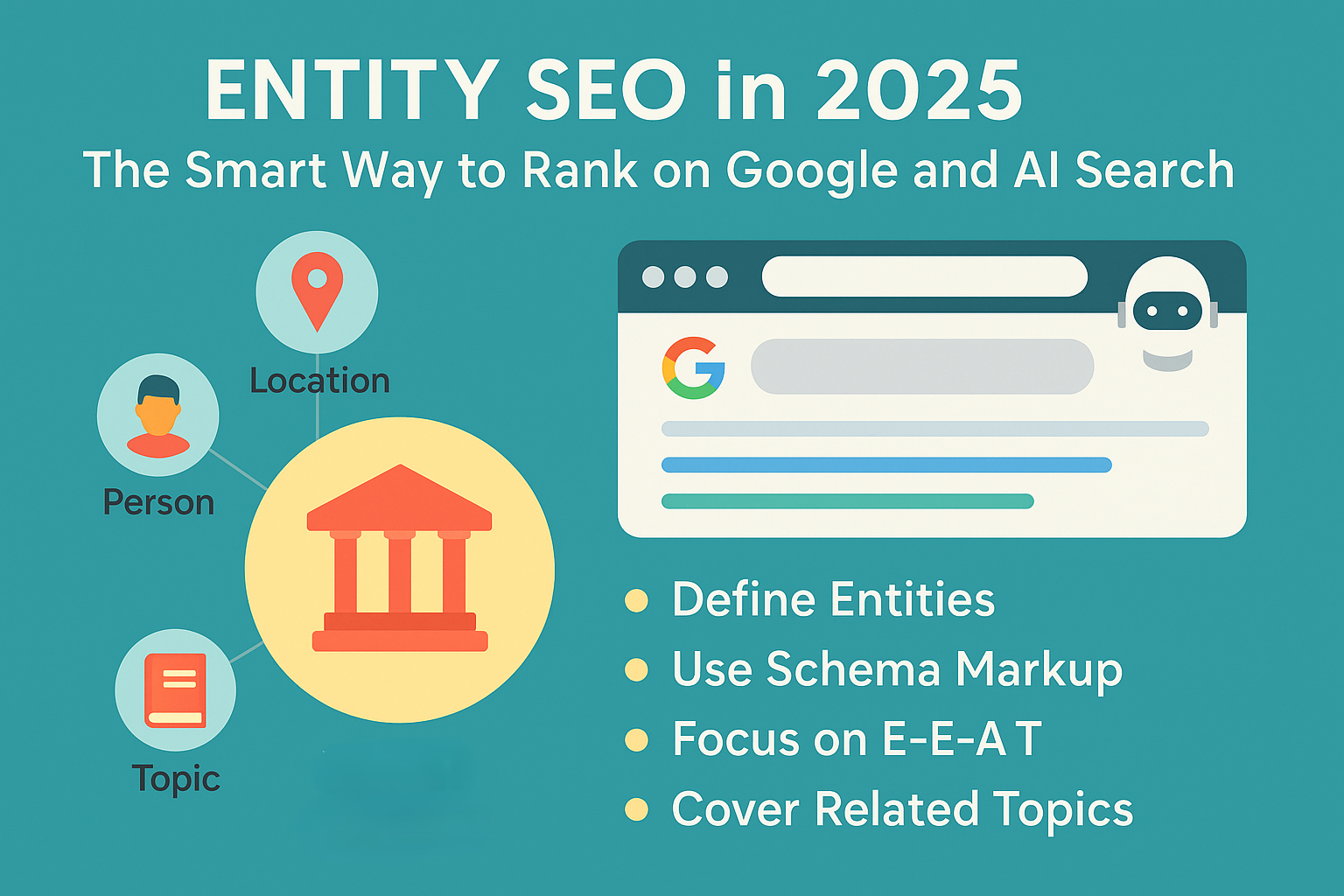SEO is no longer just about keywords. That’s where Entity SEO Strategy Works.
In 2025, Google and AI tools care more about entities — people, places, brands, topics, and how they connect.
That’s why you need Entity SEO to grow.
This blog will explain what Entity SEO is, how it works in Google’s AI search, and how to create content that builds trust, authority, and visibility.
Let’s keep it simple and step-by-step.
What is Entity SEO?
Entity SEO is a way of optimizing content for concepts and meanings, not just words.
An entity is:
- A real thing (like “Apple” the company)
- A person (like “Virat Kohli”)
- A topic (like “Digital Marketing”)
Google uses a knowledge graph to understand entities and how they relate to each other.
When your content clearly supports a known entity or becomes an entity itself, Google can trust and rank it better.
Why Entity SEO Matters in 2025
- Google’s AI reads context, not just keywords
- ChatGPT, Gemini, and SGE rely on knowledge graphs
- Entity-rich content is seen as reliable and relevant
Benefits:
- More chances to appear in featured snippets
- Better visibility in AI answers (SGE, voice, etc.)
- Increased topical authority
Learn more about question answering systems and how they influence modern AI search technologies.
Entity SEO vs Traditional SEO
| Feature | Traditional SEO | Entity SEO |
|---|---|---|
| Focus | Keywords | Concepts and connections |
| Example | “best laptops 2025” | “Laptop Buying Guide 2025” under Technology Entity |
| Goal | Rank for search terms | Be recognized in AI search as trusted source |
How to Build Entity SEO: Step-by-Step Guide
Here’s a simple Entity SEO plan for 2025.
1. Define Your Core Entity
Start with one main entity.
Example: If your blog is about “Digital Marketing,” that becomes your core topic.
2. Find Related Entities
List all the entities connected to your topic.
Tools:
- Google’s Knowledge Graph Search API
- Wikipedia
- MarketMuse, InLinks, or Clearscope
Example for Digital Marketing:
- SEO
- Google Ads
- Email Marketing
- Analytics
3. Create Content Clusters Around Entities
Make a cluster of blogs or pages.
Steps:
- One pillar article (main guide)
- 4–5 subtopics as support posts
- Interlink all posts
Example:
- Main: “Digital Marketing 2025 Guide”
- Sub: “SEO Trends 2025,” “Email Marketing Tips,” etc.
4. Use Entity-Based Language
Instead of repeating keywords, use natural phrases connected to the topic.
Bad: “Best digital marketing tools” repeated 10 times
Good: Mention tools like “Mailchimp,” “Ahrefs,” “Canva” — all are entities
How to Optimize Content for Google SGE and AI Search in 2025. Learn More.
5. Link to Trusted Sources
Google checks if you’re linked to other trusted entities.
Tips:
- Link to Wikipedia, government sites, research papers
- Cite sources to back up facts
- Use outbound links smartly
6. Add Schema Markup with Entity Info
Structured data helps Google understand what your content is about.
Use:
- Article schema
- Person or Organization schema
- WebPage + Breadcrumb + FAQPage schema
7. Build Your Own Entity Profile
Make your brand, website, or name a known entity.
How?
- Create a Google Knowledge Panel (if eligible)
- Be active on Wikidata, Crunchbase, social media
- Publish consistent content around one niche
8. Improve E-E-A-T (Experience, Expertise, Authority, Trust)
Entities that show E-E-A-T rank better.
Tips:
- Add author bios with credentials
- Mention experience in the topic
- Get mentioned or linked by others in your field
9. Use Internal Linking for Context
Internal links show relationships between topics.
Example: In a post about SEO, link to:
- “What is a Backlink?”
- “How Google Crawls Websites”
This builds a network Google understands.
10. Update and Re-Optimize Content
Entities grow and evolve.
Every 6 months:
- Update stats, dates, links
- Re-check entity connections
- Add new related topics
Quick Checklist for Entity SEO in 2025
✅ One clear core topic (entity)
✅ Clustered content structure
✅ Mentions of related entities
✅ Structured data with schema
✅ E-E-A-T signals (bios, links, sources)
✅ Interlinked articles
✅ Consistent content updates
Common Mistakes to Avoid
❌ Stuffing keywords without meaning
❌ Writing content that lacks context
❌ No schema or linking
❌ Ignoring E-E-A-T
❌ Not focusing on a clear niche
Final Thoughts
Entity SEO is the future of search.
It helps Google and AI tools trust you, understand you, and recommend you.
In 2025, building an entity is more powerful than chasing keywords.
Focus on connections, clarity, and quality — and your visibility will grow.
Need help building Entity SEO content? Explore tools and daily guides at SEOwithAI.in.

